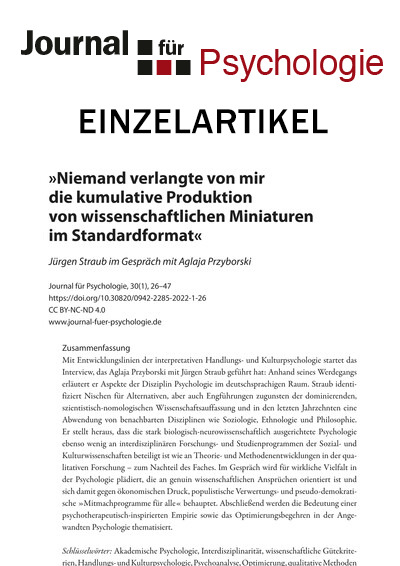»No one asked me to cumulatively produce scientific miniatures in a standard format«
Jürgen Straub in Conversation with Aglaja Przyborski
DOI:
https://doi.org/10.30820/0942-2285-2022-1-26Keywords:
Academic psychology, interdisciplinarity, scientific quality criteria, psychology of action and culture, psychoanalysis, optimization, qualitative methodsAbstract
Aglaja Przyborski’s interview with Jürgen Straub starts with the development of interpretative action and cultural psychology: Based on his career, he explains aspects of the discipline of psychology in the German-speaking world. Straub identifies niches for alternatives, but also a narrowing in favor of the dominant, scientistic-nomological view of science and, in recent decades, a turning away from neighboring disciplines such as sociology, ethnology and philosophy. He emphasizes that psychology, which has a strong biological-neuroscientific orientation, is no more involved in interdisciplinary research and study programs in the social and cultural sciences than it is in theory and method developments in qualitative research – to the detriment of the discipline. In the conversation, a plea is made for real diversity in psychology, oriented towards genuinely scientific claims and thus asserting itself against economic pressure, populist exploitation and pseudo-democratic »participation programs for all«. Finally, the importance of a psychotherapeutic empiricism as well as the desire for optimization in applied psychology are discussed.
Downloads
How to Cite
Straub, Jürgen, and Aglaja Przyborski. 2022. “»No One Asked Me to Cumulatively Produce Scientific Miniatures in a Standard format«: Jürgen Straub in Conversation With Aglaja Przyborski”. Journal für Psychologie 30 (1):26-47. https://doi.org/10.30820/0942-2285-2022-1-26.
Issue
Section
Artikel
License

This work is licensed under a Creative Commons Attribution-NonCommercial-NoDerivatives 4.0 International License.
This license allows private use and unmodified distribution, but prohibits editing and commercial use (further information can be found at: https://creativecommons.org/licenses/by-nc-nd/4.0/).
The terms of the Creative Commons licence only apply to the original material. The reuse of material from other sources (marked with a reference) such as charts, illustrations, photos and text extracts may require further permission for use from the respective copyrights holder.


